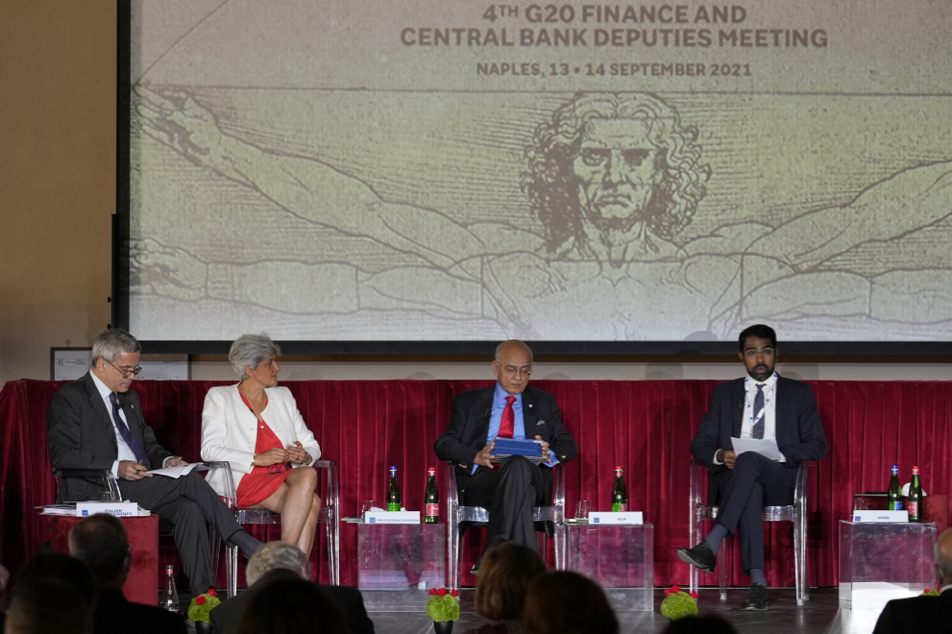Remarks delivered by Dr Sudhvir Singh
I want to extend my appreciation and that of the Independent Panel co-chairs Prime Minister Clark and President Sirleaf to the Government of Italy for hosting this important dialogue.
The COVID-19 pandemic has brought home how ill-prepared countries were for a pandemic. The Independent Panel found that most governments were not able to mobilise the multi-sectoral responses needed quickly enough, that long-standing under-investment in pandemic preparedness had left big gaps, and that available response funds were too little and too late for many countries. Pandemic preparedness was perceived as a role of ministries of health – only in a crisis would it reach the domains of Prime Ministers, Presidents or Ministers of Finance.
As we have heard, the G20 High Level Independent Panel on Financing the Global Commons, and the Pan European Commission chaired by Professor Monti, have both made the case that the pandemic crisis has caused systemic risk analogous to the systemic risk of collapse in the financial system that the global financial crisis caused, and by analogy, a body like the Financial Stability Board needs to be created to build the system back and restore global trust.
Likewise, the Independent Panel directed its recommendations to that central question of systemic risk and strengthening the overall global system for pandemic preparedness. The key issue is how do we best ensure continued high-level political leadership, which all the panel reports have recognised the need for. The coordination of health and finance is one aspect, but in the Panel’s view the nature of the problems COVID-19 revealed show that what is most needed is buy-in from Heads of State and Government to ensure action and accountability across the whole-of-government. There is no quick technical fix. This is a governance and leadership challenge.
The review bodies have all converged on the need for a more independent, sustainably financed, and authoritative WHO. There is also convergence on the scale of new financing that is needed, indeed our report and that of the G20 High Level Independent Panel on Financing the Global Commons have similar estimates of 10-15 billion dollars per annum being required. We agree that this should not lead to new institutions and instead focus on minimising duplication within the existing global health system by channelling money through existing organisations based on their comparative advantages and functions.
We also see the value of engaging finance and health ministers in discussion about a potential financing mechanism. But there are needs for strengthened governance at multiple levels –our Panel gave top priority to ensuring high-level political engagement and responsibility for pandemic preparedness and response at large.
These are not only issues for the future – they need tackling immediately. For example, it is very important that WHO has established targets for global vaccination in line with the Panel’s recommendation, and we welcome how G20 Health Ministers have subsequently acknowledged these targets in their declaration this week. But from words to action requires high-level political leadership.
Every week that goes by with a widening vaccination gap between rich and poor further erodes global trust and demonstrates that our systems for governing and financing public goods to tackle pandemics are dysfunctional and inadequate, exposing a credibility gap between global commitments and reality on the ground.
So, the questions of governance and accountability which are on the table go also to the issue of trust. In the view of the Independent Panel, it is vital that any new structures have widespread political legitimacy and are inclusive in nature.
To maximise legitimacy and inclusiveness, the Independent Panel recognised the important role for the United Nations General Assembly in endorsing at a leader-level summit a political declaration on reform of the global architecture around pandemic preparedness and response. For the high-level Global Health Threats Council, we recommended that two of the Co-Chairs should be nominated by the UN General Assembly, and one should be nominated by the G20. We were pleased to see the report of the G20 High Level Independent Panel on Financing the Global Commons endorse the need for such a Global Health Threats Council in addition to a financing mechanism.
We know that global health security, and the global public goods of pandemic preparedness and response, are undone by their weakest link. So, ensuring leader level accountability and legitimacy in the eyes of all Member States is not a ‘nice to have’ as we move forward – it is a ‘must have’.
In conclusion, we believe that is important to move ahead with a Global Health Threats Council and a dedicated financing mechanism for pandemic preparedness and response as soon as possible.
